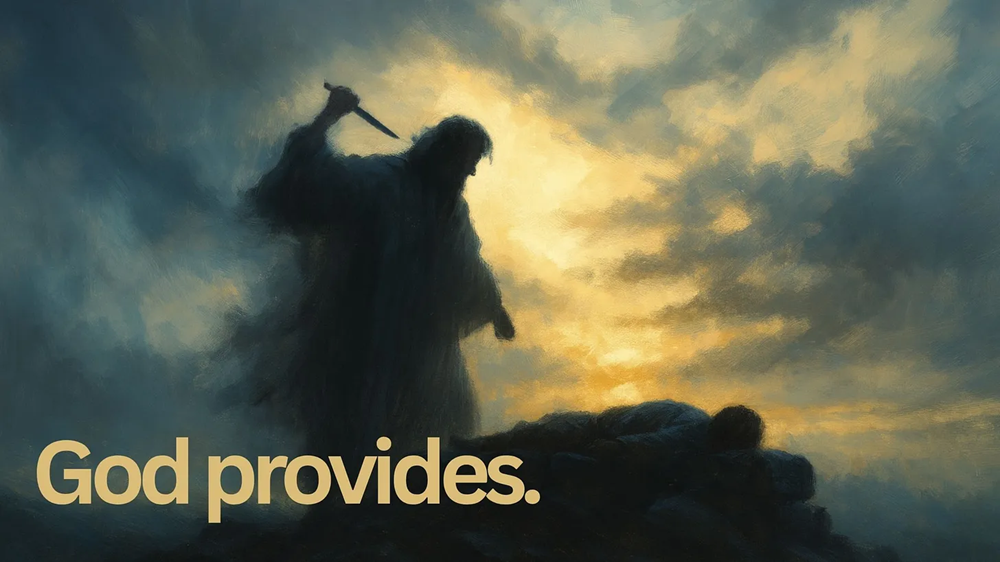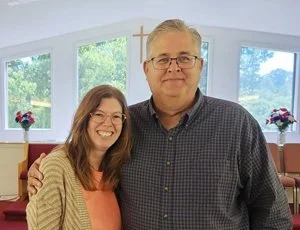Abraham: A Road None of Us Want to Travel
By Rich Bitterman
Abraham walked a road none of us want to travel—obedience that costs everything.
Genesis 22:1–19 (IMAGE: Three Days to the Altar)
Three days.
Each step pressed the weight of obedience deeper into his ribs.
Three days with rope in his bag, a knife strapped to his side, and wood he had split himself. Three days with his boy walking beside him asking where the lamb was.
What he said wasn’t for Isaac. It was for himself.
“God will provide, my son.”
He didn’t know how. He only knew Who.
He tightened his grip on the rope.
And kept walking.
Not All Faith is Calm
By the time Abraham reached Moriah, he was well over a hundred years old. This wasn’t a young man’s obedience. It wasn’t impulsive or naive. He had walked with God for decades, through barrenness and blunder, laughter and loss.
He had watched smoke rise over Sodom. He had sent his firstborn, Ishmael, into the desert with only a waterskin. He had seen the slow, miraculous rise of Isaac’s life…the boy whose very existence bent the laws of biology and time.
He had heard God’s promises. Held them. And now, here at Moriah, the same God who had sworn that Isaac would carry the blessing told him to bind the boy and bring the blade.
No explanation. Just a command.
“Take your son. Your only son. The one you love.”
No father should ever hear those words. No believer should ever have to choose between obedience and their heartbeat. And yet Abraham obeyed, not with dry eyes or a blank mind, but with trembling hands.
Faith that obeys doesn’t always smile. Sometimes it binds what it loves most.
The Walk to the Mountain
We don’t talk enough about the walk.
Three days is a long time to question everything. Long enough for a thousand second guesses. Long enough to curse the silence. Long enough to rehearse the promises and ask, “Was I wrong?”
I remember once sitting in a hospital hallway. A dear church member was slipping from this world. His daughter, crumpled in a vinyl chair, asked me why God didn’t come sooner. Why the prayers didn’t change the prognosis.
There are moments in life when faith has to walk through silence. And that’s when the real questions rise: Do you trust God when the promises feel like lies? Do you worship when worship feels like a funeral?
That’s the test.
And Abraham passed it. Not because he understood. But because he refused to let God’s command cancel God’s character.
He held both in tension.
And he kept walking.
‘We Will Come Again’
When they reached the mountain, Abraham told his servants something no grieving father would say unless he truly believed it:
“Stay here. I and the boy will go up… and we will come back to you.”
He believed.
Hebrews tells us he reasoned God could raise the dead. There had never been a resurrection before, not in recorded history. But Abraham didn’t need precedent. He had a promise. And sometimes that’s enough.
So up the mountain they went. Isaac carried the wood. Abraham carried the knife. The fire burned between them.
And somewhere between that last step and the altar’s stones, Abraham stopped being just a man of faith and became the father of all who believe.
When Obedience Hurts
He built the altar. Arranged the wood. Spoke the words no father should ever have to say. Bound Isaac.
That’s the part we skip over too easily. This wasn’t a lamb. This was his boy. Isaac didn’t struggle, at least not in the way we’d expect. There’s a quiet submission in the text that aches deeper than shouting would have.
Maybe he believed too. Maybe he trusted his father because his father trusted God.
Abraham raised the knife.
And just before it fell, heaven thundered.
“Abraham! Abraham!”
The knife stopped. Not because it paused midair, but because God spoke again.
Some of you are there right now. The knife is raised. The altar is built. The test is burning. And you’re wondering if God has gone silent.
He hasn’t.
He just speaks on His timing.
The Lamb Was Always Coming
There was a ram in the thicket.
Caught.
Waiting.
God had provided. Not before the test. Not halfway through. Not even on the climb. But at the top. At the altar. At the breaking point.
That’s where grace lives.
And Abraham named the place Yahweh-Yireh, “The Lord will see to it. The Lord will provide.”
That name still holds. When your strength fails. When the promise seems broken. When you’re staring down obedience with nothing but tears and trust.
Because this story was never just about Abraham.
It was always pointing to another Father.
Another Son.
Another mountain.
Golgotha Was Moriah’s Echo
Centuries later, another Son would carry wood on His back.
Another Father would lead Him up a hill.
There would be no ram this time. No voice to stay the hand. No substitute to take the place.
Because the Son was the Lamb.
He would lie down willingly.
He would be bound by nails.
And the knife would fall.
For you.
That’s the difference between Isaac and Christ. Isaac’s story ends with a substitute. Christ’s story ends with Him being the substitute for every sinner, every rebel, every wandering heart.
God did not spare His own Son. Because He would rather raise Him from the dead than break His promise to you.
When the Knife Is Raised in Your Life
Maybe you’re walking through your own Moriah.
Maybe the call to obedience has taken something from you. Maybe you’ve prayed, and heaven has stayed silent. Maybe you’ve come to the altar with nothing left but rope, fire, and surrender.
Hear this:
God tests, not to destroy you, but to refine you. Not to wound, but to strengthen. Not to see you fall, but to make sure you rise.
He sees.
He provides.
He still speaks.
Not always before the knife rises.
But always before it falls.
And the Lamb—Christ Himself—is always waiting at the top of the mountain.
Questions for the Tested
What altar has God called you to build, even when it feels like loss?
What promises feel at odds with the command He’s given?
Can you obey before you understand?
Are you willing to walk three days in silence, just to hear Him speak again?
You are not forgotten.
You are not walking alone.
The road to the altar is steep.
But the ram is coming.
And so is the voice that calls your name.
I’m Pastor Rich Bitterman, a country preacher from the Ozarks. Guy Howard, the old Walking Preacher, once wore out his boots traveling from church to church, meeting strangers and sharing the gospel. I’m doing the same today on digital roads. Each post is a visit. Each verse is a step. Let’s walk the Word together.


